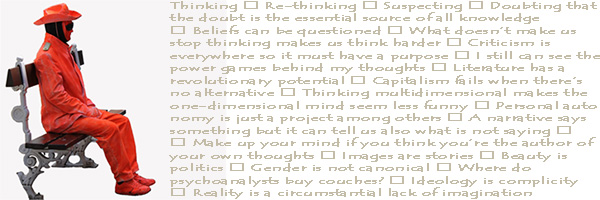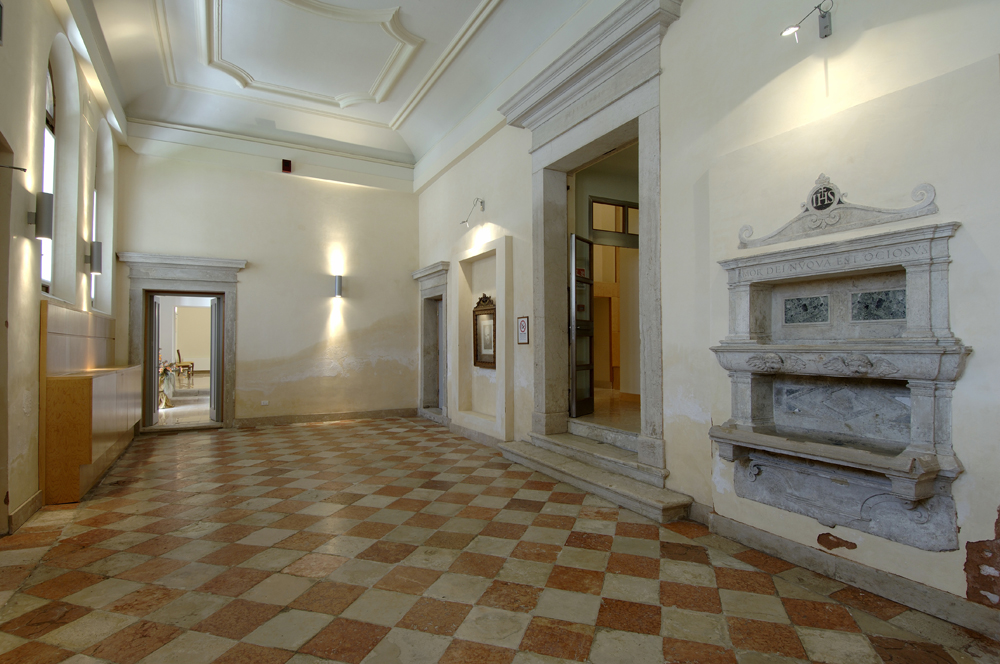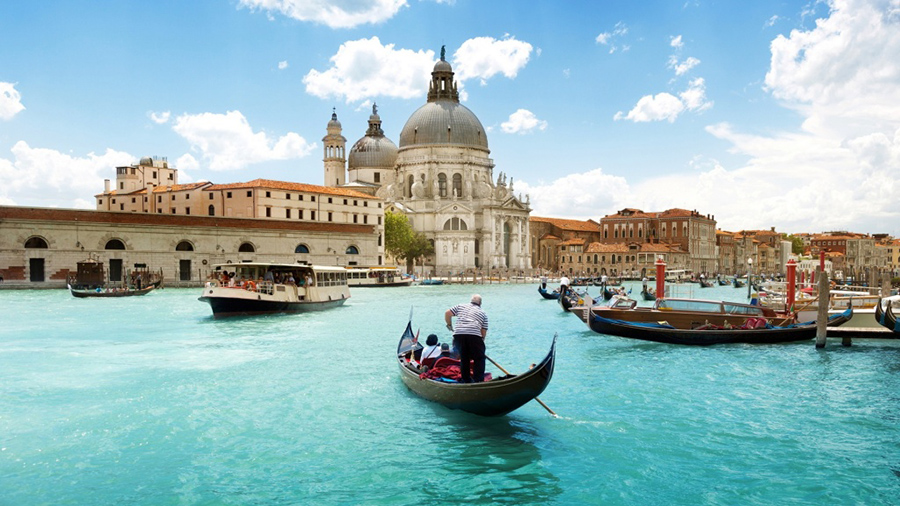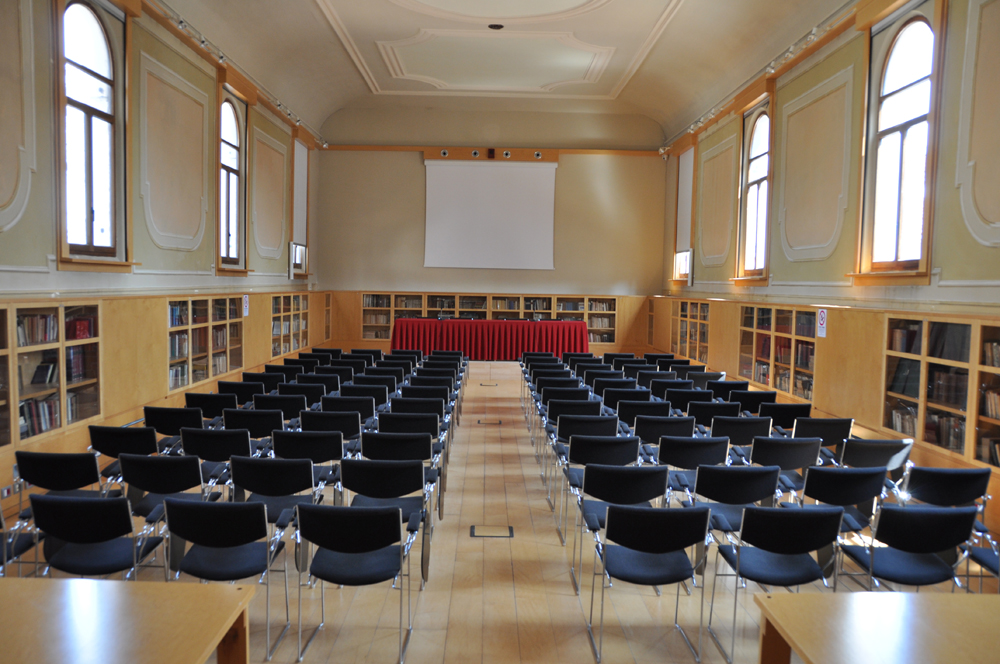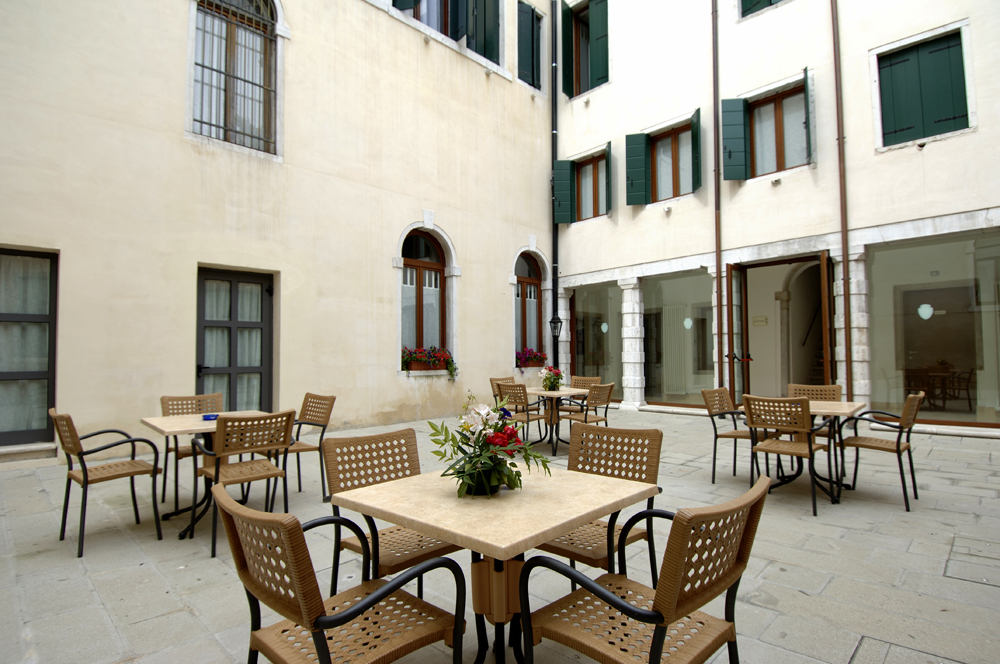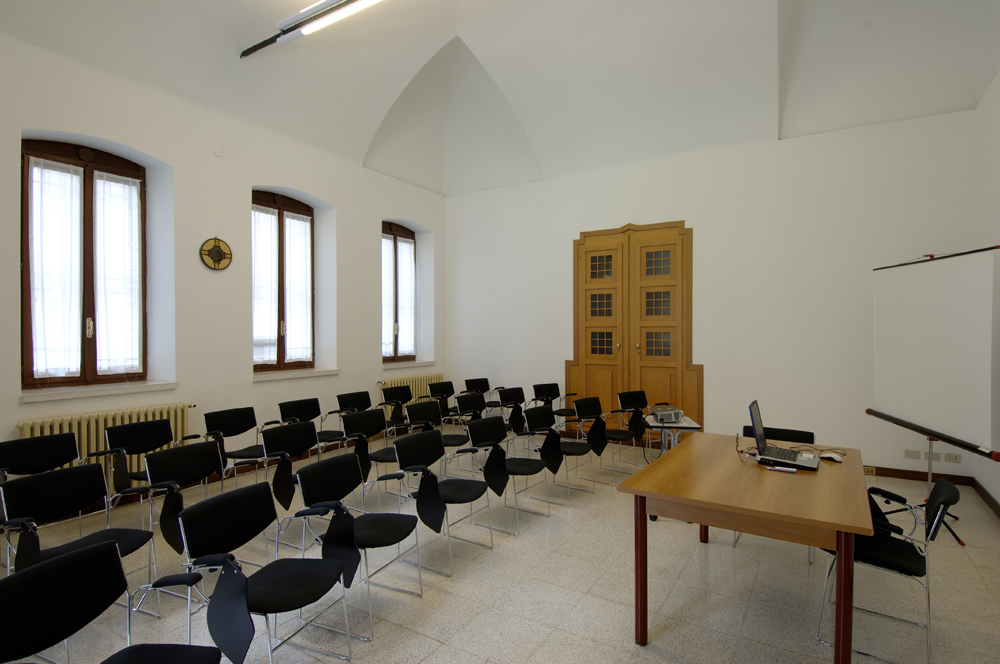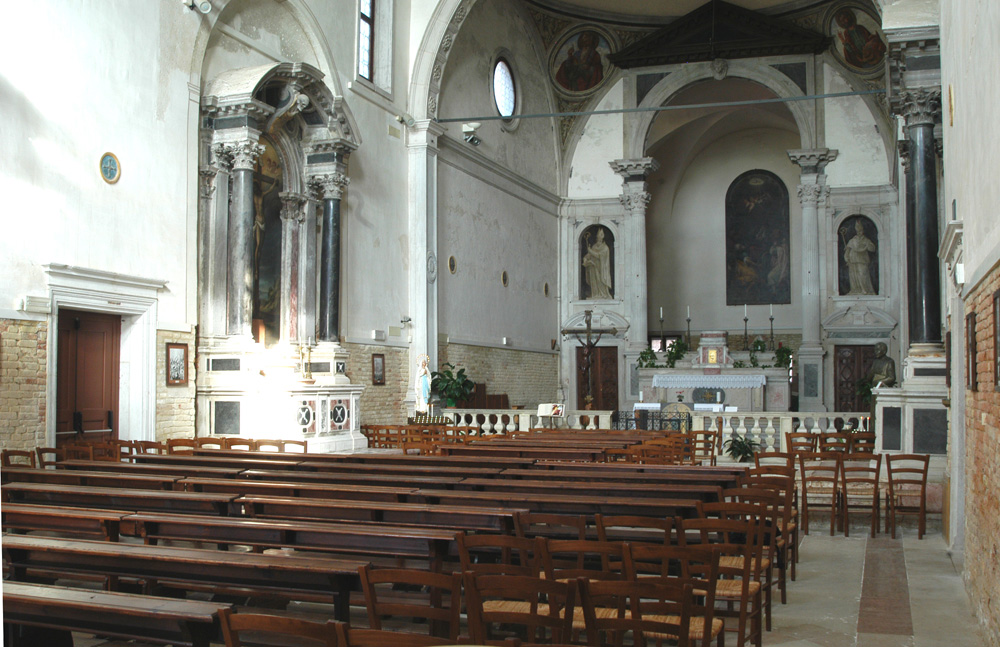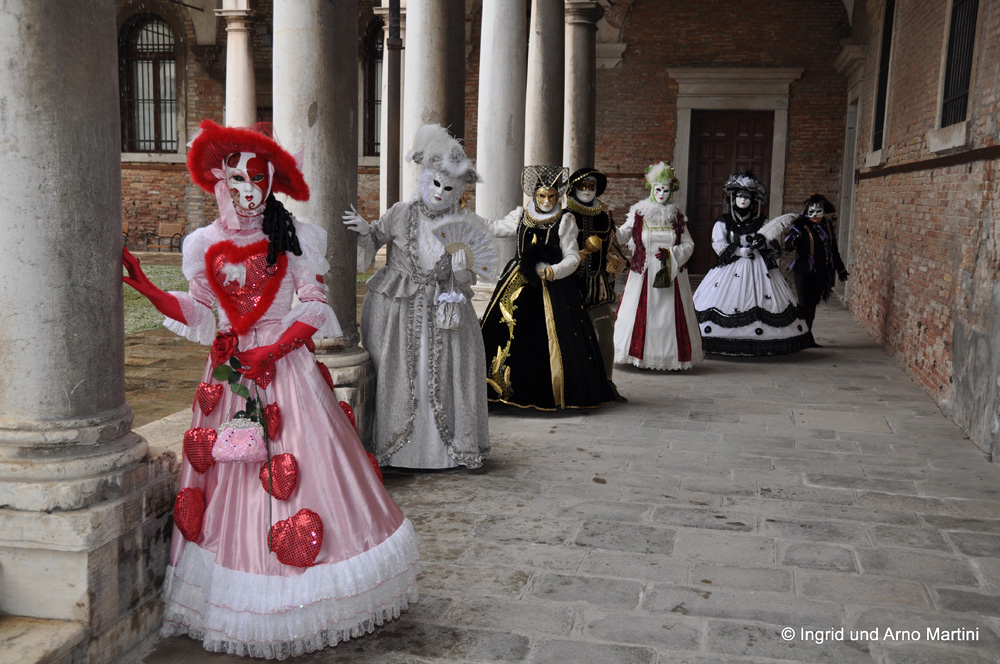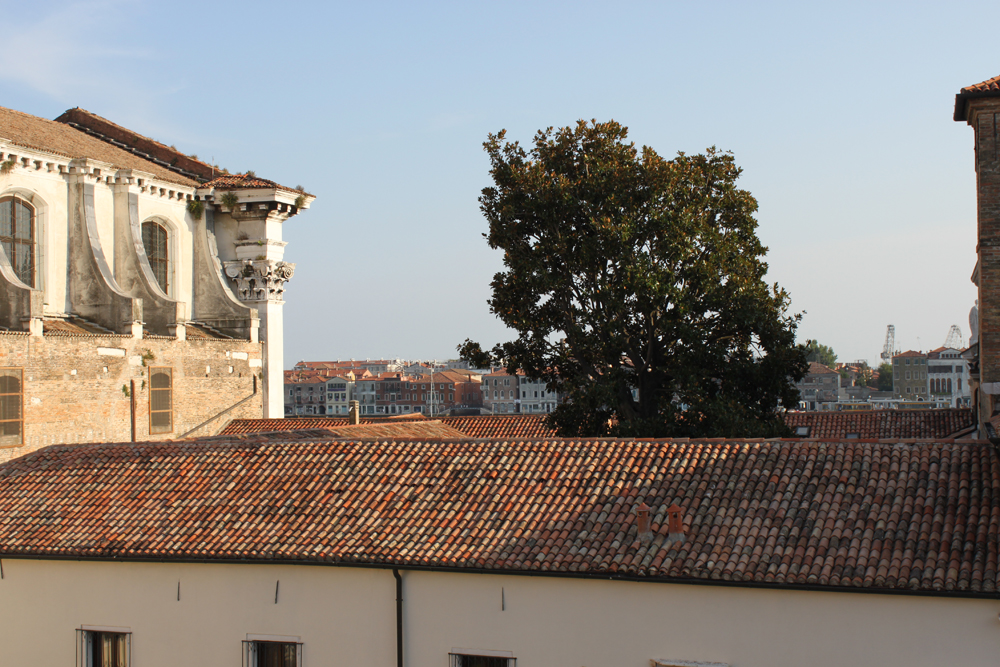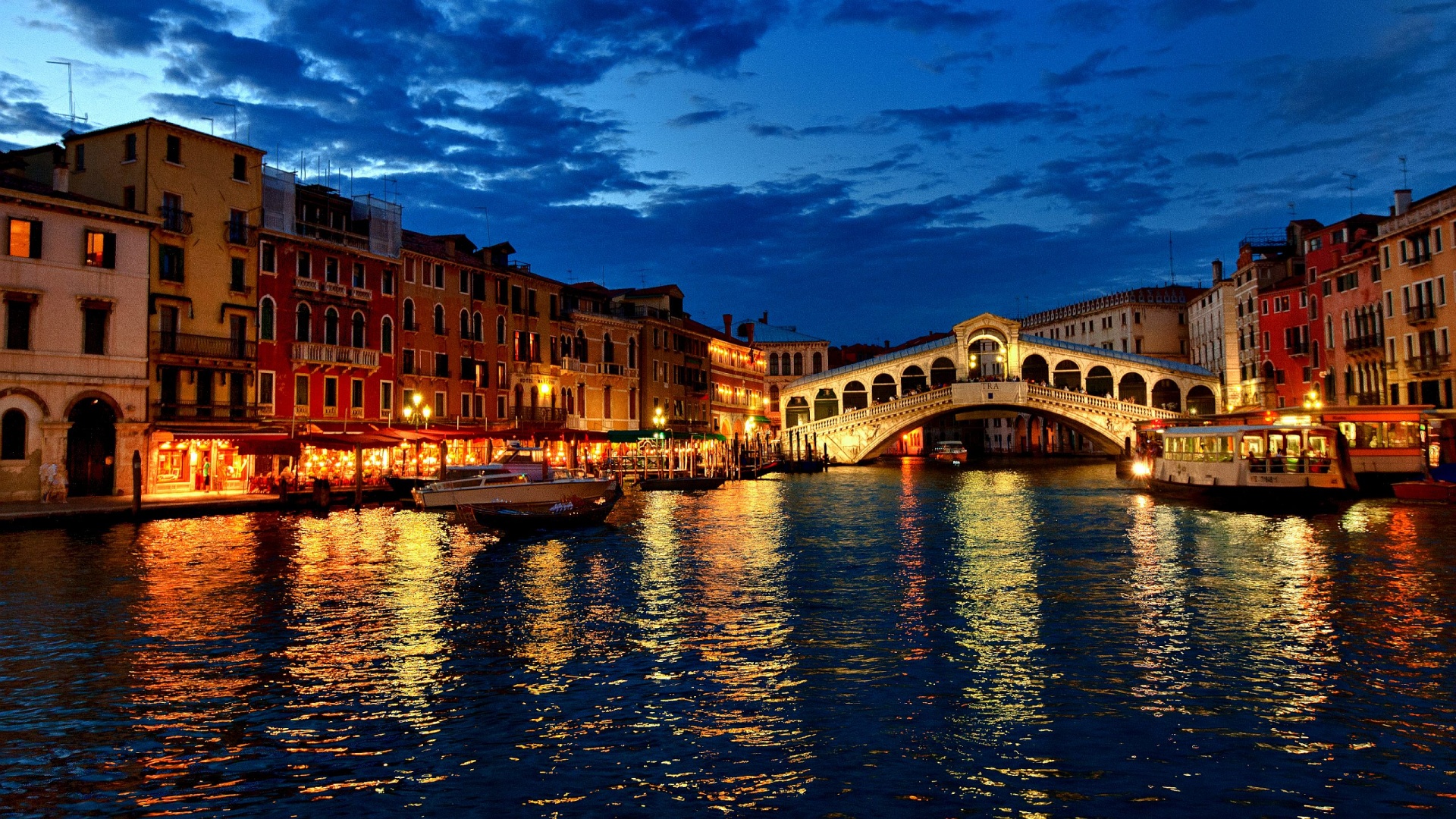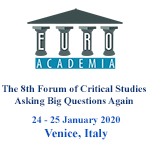Cultural Centre Don Orione Artigianelli
Dorsoduro 909/a, 30123, Venice, Italy
Conference Room: Vivaldi
Keynote Workshop
James Block (DePaul University, Chicago, USA)
Why the “Big Questions”: Exchanging Perspectives
Conference Agenda
- January 24, 2020
- 08:30 - 08:45Participants Registration (Registration Desk) – Conference Room Vivaldi
- 08:45 - 09:30Welcome and Opening Remarks - Critical Times: A Call for Critical Thinking ~ Asking Big Questions Again
- 09:30 - 10:30Keynote Workshop: Why the “Big Questions”: Exchanging Perspectives (James Block, DePaul University, Chicago, USA)
- 10:30 - 11:00Coffee Break
- 11:00 - 13:00Panel 1: Philosophy and Critical Thinking: Bridging the Gap between Critical Theory and Social Praxis by Revisiting Turning Points of Reflection from Kant to Marx, Nietzsche and Phenomenology
- 13:00 - 14:30Italian Specialties Lunch –Restaurant
- 14:30 - 16:30Panel 2: Art as Cultural Diplomacy and Legacy: Critical Assessments of Politicized Representations, Cultural Influence, Performative Memorialization, Heritage and Identity Making through Arts
- 16:30 - 17:00Coffee Break
- 17:00 - 19:00Panel 3: Performing Identities and Feminist Epistemologies: Performativity of the Body, Gender, and Sexuality and the Relationship between Identity and Performance in Cultural Movements, Art History, Literature, and Film
- 19:00 - 19:30Concluding Discussions for the First Day of Conference
- 19:30 - 20:30Optional Social Dinner Out in Venice
- January 25, 2020
- 08:30 - 10:30Panel 4: Identity and the City: Urban Transformations, Transition and Change in Urban Image Construction
- 10:30 - 11:00Coffee Break
- 11:00 - 13:00Panel 5: Piety, Fictionality, Identity, Unpredictability and the Self in Literary Narratives and Critical Art History
- 13:00 - 14:30Italian Specialties Lunch –Restaurant
- 14:30 - 16:30Panel 6: Critical Contemporary Politics and Economics: From Critical Discourse Analysis to Experiments in Identity, Inequality and Scenarios on the Future of Political and Economic Projects of Europeanization
- 16:30 - 17:00Coffee Break
- 17:00 - 19:00Panel 7: Politics of Europeanization from Community Making to the Eurozone Crisis: Readings of the Past and Scenarios for the Future
- 19:00 - 19:30Closing Session: Discussion and Final Remarks
- 19:30 - 20:30Optional Social Dinner Out in Venice
- January 24, 2020
8th Forum of Critical Studies: Asking Big Questions Again
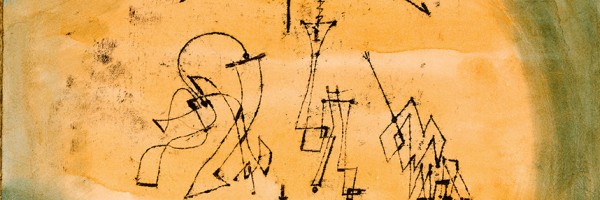
- Conference Description
- Participant’s Profile
- Registration and Fee
- Social Activities and Publication
- Important Dates
- Venue and Directions
- Conference Program
- KEYNOTE WORKSHOP
- Panel 1
- Panel 2
- Panel 3
- Panel 4
- Panel 5
- Panel 6
- Panel 7
The 8th Euroacademia
Global Forum of Critical Studies
Asking Big Questions Again
24 – 25 January 2020
Cultural Centre – Don Orione Artigianelli
Venice, Italy
Keynote Workshop:
Why the “Big Questions”: Exchanging Perspectives
James Block (DePaul University, Chicago, USA)
Conference Description:
Some say that the 21st Century or modernity altogether made humans more concerned with doing rather than being. As the classical Greek civilization valued most the reflexive thinking as a form of freedom from natural necessities, contemporary times profoundly involve individuals and the imaginary accompanying social practices in a restless logic of consumption, competition and engagement that profoundly – or some would say, radically – suspends or indefinitely postpones the autonomous capacity of human beings to question and reflect upon the social order and the meaning of social practices. The fast advancement of a peculiar logic of post-industrial societies, the gradual dissolution of alternative models to the capitalist logic and a multitude of other alerting factors pushed ahead a global spread culture of one-dimensional productions of meaning that advances a closure rather than a constant reflexive re-evaluation of cultural and social practices.
Many alternatives at hand are often condemned to marginality or lost in the quasi-plural practices where everything goes as long as it’s part of an intellectual market or sloganistic trend. The ‘fatal strategies’ of post-industrial societies to keep individuals captive, busy and seduced by contingent social arrangements and economic practices minimized the questioning detachment required to evaluate and give meaning through reflexive criticism and unlimited interrogation. Various labels were given to our unfolding times from apocalyptic ones to some more comforting yet, not by chance, lacking some vital optimism. Despite a wide-spread discontent and suspicion towards daily realities of our current societies, most of big questions are often left outside by the self-involved active pursuit of an imagined well-being that is no longer transgressed by harsh critical evaluation of its meaning. The academic arena itself also advances, supports, integrates and promotes limited particular methodologies that generate an effect of mainstreaming and often keeps researchers or practitioners out of the battle-ground for the big questions.
The ongoing economic crisis made reality even harsher and pushed ahead the need for more thinking as many habitual categories lost their meaning or relevance. New ways of thinking could transgress some inappropriate conceptions or misconceptions that preserve their centrality due to the mechanics of habit. Some other approaches that gained recognition and liquid validity just by the virtue of being new could be questioned as well in a wider and plural arena of intellectual interaction. This is a time when a call to thinking is well-placed. This is a call to arms for critical studies that promotes alternative, questioning and multidimensional thinking. It is based on the belief that thinking more is asking more and the answers come from creative constructive reasoning if left unbiased.
The 8th Euroacademia Global Forum of Critical Studies aims to bring into an open floor the reflexive and questioning interaction among academics, intellectuals, practitioners, performers, artists and activists profoundly concerned with evaluative understandings of the world we’re all living in. The focus of the forum is to initiate an arena where no question is misplaced and irrelevant as long as we acknowledge that evaluation, critical thinking and contestation are accessible trajectories to better understanding our past, present and alternative scenarios for the future. The Forum is also an open stage for sharing existing or ready formed intellectual visions and expose them to dialogue and scrutiny in a critically reflective environment. The 8th edition of the forum aims to become a creative meeting point for all the critical studies perspectives coming from intellectuals, academics, performing artists, change makers and idea shapers.
Participant’s Profile
The conference is addressed to academics, intellectuals, researchers, artists,performing artists,professionals / practitioners and activists profoundly concerned with evaluative understandings of the world we’re living in. The conference aims to stimulate critical reflection and therefore intellectual exercises in critical thinking beyond professional and disciplinary boundaries are given preference and strongly welcomed. As the nature of the conference is intended to be multidisciplinary in nature and critically dialogical in practice, different academic backgrounds and levels are equally welcomed.
Post-graduate students, doctoral candidates and young researchers are welcomed to submit an abstract. Representatives of INGOs, NGOs, Think Tanks and activists willing to present their work, research, experiences or reflections are welcomed as well to submit the abstract of their contribution. Euroacademia does not promote the ‘byzantine’ association of people with their institutions. As well the distinction between senior and junior researchers is not applied as a cleavage.
Session proposals and abstracts will be reviewed by the Selection Committee and the participants are selected based on the proven quality of the abstract and the capacity to contribute to stimulating intellectual dialogue. A critical studies stand-point is required in the selection. The submitted paper for the conference proceedings is expected to be in accordance with the lines provided in the submitted abstract.
Registration and Fee
Registrations Process is Now Closed
The Participation Fee Includes:
- the registration fee
- official invitation for the event
- participant’s package with all the materials for the conference
- full access to all sessions of the event
- eligibility for publishing of the presentation in the conference volume
- a copy of the electronic volume
- access to Euroacademia discussion group and newsletters
- daily coffee brakes with snacks and refreshing drinks during the conference
- lunch on 24th of January 2019 at the Restaurant San Trovaso
- lunch on 25th of January 2019 at the Restaurant San Trovaso
- certificate of attendance
- access to optional social program
Unfortunately, Euroacademia has no available funds for covering transport and accommodation to/in Venice. Participants are responsible for securing funding from their institutes of affiliation to cover transportation and accommodation costs during the whole period of the conference. Official invitation letters can be sent by Euroacademia to the financing institution to confirm the selection and participation in the conference upon request.
Social Activities and Publication
A specific spot in the conference program will be dedicated to social networking and therefore all the participants interested in setting or developing further cooperation agendas and prospects with other participants will have time to present and/or promote their project and express calls for cooperation.
Photos and videos will be taken during the conference and the organizers will consider through the participation of selected presenters or members of the audience that the agreement for being photographed or filmed during the event was granted through registration to the event. Please notify the organizers in written form prior to the the event if you are a confirmed participant and would prefer otherwise.
A specific setting (Social Corner) for promotional materials connected with the topic of the conference will be reserved for the use of the participants. Books authored or edited by the participants can be exhibited and promoted during the whole period of the conference and can also be presented within the conference package based on prior arrangements.
An optional dinner and as social event will be organized for the three evenings of the conference in a typical Venice restaurant as optional program for the willing participants. The social dinner will be held based on participant’s prior confirmation and it will require costs to be covered by the participants individually on-site at the restaurant.
Publication:
Selected papers will be published in thematic volumes after the confirmation of the authors and a double peer-review process based on an agreed publication schedule. All the papers selected for publication should be original and must have not been priory published elsewhere.
| Important Dates & Deadlines | |
|---|---|
| 15th of November 2019 | Deadline for Submitting Panel Proposals |
| 5th of December 2019 | Deadline for Submitting Paper Proposals |
| 6th of December 2019 | Final notification of acceptance |
| 12 December 2019 | Deadline for sending the Registration Form |
| 16th of December 2019 | Deadline for the Payment of the Participation Fee |
| 14th of January 2020 | Sending the draft paper to be uploaded on the website of the conference (optional) |
| 15th of January 2020 | Publication of the conference program and uploading the draft papers on the website |
| 24th of Januay 2020 | The conference commences at 8.30 AM |
Venue and Directions
The conference will take place in the XVth century Cultural Centre Don Orione Artigianelli, centrally located in the heart of Venice, located in an enchanting part of the city, just between “Gallerie dell’ Accademia” and the quayside Zattere, next to Gesuati Church and the Church Santa Maria della Visitazione, a 10-minutes walk from St Mark’s Square. Dorsoduro 909/a – 30123 Venezia – Italia Cultural Centre Don Orione Artigianelli was established in 1423 as a Jesuits’ monastery, lay brothers who dedicate themselves to look after the sick. At the end of the fifteenth century they also began the construction of the church of St. Mary of the Visitation. In 1669, the convent and church were purchased by the Dominican Fathers, who erected the new church of Santa Maria del Rosario and began the extension of the monastery under the direction of the architect Giorgio Massari. In 1810 Napoleon issued a decree for the dissolution of the religious order and confiscated the goods. From 1815 to 1850 the building was managed by the Municipality of Venice as an orphanage which, from 1851 to 1866, was entrusted to the Somaschi Fathers from San Girolamo but their congregation retired in 1866. The orphanage was purchased in 1867 by the Congregation of Charity, a lay organization with an educational purpose which decided to sell the property in 1923. On the 4th of August 1923 Don Orione purchased the entire property, thus continuing its work of helping orphans and children with hard family conditions. For decades, the boarding school with its professional schools and laboratories of mechanics, carpentry and typography was concerned with the education of hundreds of young people whose skills, once they graduated, were very appreciated in the world of business, hence the name “Artigianelli Institute”. In the early Eighties’, the mission of the centre changed from child care to support to young University students, in order to face different tendencies and several requests to provide accommodations to students who, every day came from various, even far, places to attend the numerous University departments of the city.
Cultural Centre Don Orione Artigianelli
tel. 0039 041 5224077
fax 0039 041 5286214
[email protected]

HERE
Conference participants are responsible for arranging the accommodation and travel to/in Venice.
Conference Program
The Conference Agenda is available in the right sidebar of this page.
The extensive conference program with abstracts and available draft papers is accessible below by clicking on the panel number tabs and links of individual presentations.
Keynote Workshop
James Block (DePaul University, Chicago, USA)
Why the “Big Questions”: Exchanging Perspectives
This session will involve a collaborative conversation among conference participants, a chance to discuss the interests and concerns that brought us to the meeting and to suggest what we hope to gain. Engaging with the “big questions,” the Conference Call for Papers emphasizes, has been pushed to the margins of contemporary discourse in the public, cultural, and academic arenas. Is this the experience of most of us attending this Conference?
To the extent we have encountered this complacent ratification of business as usual, and have decided by our presence that we are unwilling to join in taking refuge from engaged interrogation and change
- What has led each of us to question the power and viability of the boundaries demanded by this retreat from engagement?
- What are the costs to ourselves and to our communities of this retreat – and what feels most acutely “wrong” to you about what is happening?
- What do we believe can be gained from keeping the “big questions” alive? [Is it possible that we are in part anxious of the power and possibility of what we want?]
- What are some of the fears, anxieties, and confusions we and others face in addressing “big questions” – troubling issues about our lives and societies that we might need to confront, the changes in ourselves and our community and world – that have prevented a more searching investigation to proceed?
- Is it enough to ask questions, even good ones, be critical, examine closely – or are there next steps, that we are called to think through together?
- Is there a form of thinking, even kinds of questions, that open up more than critique in the way of reframing new potentialities for actualization and communal well-being, that bring into focus initiatives beyond the boundaries and contentions of present discourses? Examples!?
- How might posing these latter questions enlarge or transform our own role in shaping our lives and priorities and reshaping the world?
- Where do we now or might we, one – you! – start or carry on, say tomorrow, on a next step? Please say more about what and why…
- What might be one thing you would hope to take away from here?
James E. Block is professor of Political Science at DePaul University (Chicago, USA ). He holds a Ph.D. from the University of Chicago, Committee on Social Thought, J.D. from New York University, and M.A., History of Ideas, from the University of Sussex. He also studied at Columbia University in a joint program with Wolfson College, Oxford.
(See More Here)
Philosophy and Critical Thinking: Bridging the Gap between Critical Theory and Social Praxis by Revisiting Turning Points of Reflection from Kant to Marx, Nietzsche and Phenomenology
- Enlightenment Reloaded: How to Become Better as Individuals and Humankind?With Kant, who was an academic teacher for more than 40 years and also a philosopher-educator of the enlightenment, my attempt is to show how we can do our best to teach freedom. If you are interested in the question how we as humans can become better, you are invited to re-think Kant’s thoughts on morality and to find helpful equipment for your autonomous thinking to re-ask the big questions in the new contexts of our days.Sandra Eleonore Johst, Hochschule für Philosophie München, Germany
- Ideology and Creation in Marx´s Historical Materialism: A Problem of JustificationI consider three interpretations of Marx´s claim that the materialist answer to the question of Creation will be clear under communism, but argue that all fail because Marx does not give any independent reasons for believing that people´s beliefs under communism enjoy any epistemic superiority to the ones that are held now. I finally conclude, in line with Daniel Brudney, that Marx´s failure to provide such a justification could be indicative of Marx´s general incapacity to provide abstract justification due to his rejection of philosophy.Facundo Rodriguez, London School of Economics, UK
- Recurring of Enlightened Dark Ages: Rethinking the Discourse of Democracy through the Nietzschean Framework of the Death of GodThis paper aspires to argue that democracy gradually becomes an alienated kind of religious belief that serves as the absolute truth of the postmodern age for those political protesters. Following these premises, this paper aims at rethinking the discourse of democracy through contextualizing it under the prism of the death of god. It argues that democracy actually takes up the former position of the theist god, becoming a sophistic kind of truth that forms the belief of postmodernism.Junfu Wong, University of Cambridge, UK
- The New Phenomenology: Re-discovering Emotions through AtmospheresIn the modern age, among all the cultural and societal conquers, we are all spectators as well as victims of a deep solipsistic isolation and a sort of "disembodiment", i.e., the dissolution of the own body as the sounding board of emotions in collective contexts. The present talk wants to propose again the phenomenological lesson on the lived body, conceived as "the real core of subjectivity" , both from Merleau-Ponty's works and the New Phenomenology, which is a totally new project in philosophy aiming at exploring the atmospheric, pre-cognitive dimension of existence, against all the technological self-alienation.Veronica Iubei, Faculty of Philosophy, Heidelberg University, Germany
Art as Cultural Diplomacy and Legacy: Critical Assessments of Politicized Representations, Cultural Influence, Performative Memorialization, Heritage and Identity Making through Arts
- Cultural Diplomacy “of Great Propagandistic Value”: The First Russian Art Exhibition in Berlin 1922The First Russian Art Exhibition in Berlin in 1922 was by then certainly the major event of official Soviet cultural diplomacy in Germany. It was a materialization of the Treaty of Rapallo, signed between Soviet Russia and Germany in April 1922, that marked the beginning of a German-Soviet special relationship within the cultural sphere. In my paper I intend to contextualize the exhibition within the development of Soviet cultural diplomacy in Germany and to give an insight into the institutional possibilities and restraints for Soviet artists that varied within the 1920s.Viktor Kempf, Albert-Ludwigs-Universität Freiburg, Germany
- From Barbaric Noise to Beloved Melodies – An Organ Grinder and Sonic Identity of the City in Nineteenth-Century Soundscape of WarsawSince my research project is about Warsaw at the turn of nineteenth and twentieth century, I will draw examples from this particular soundscape.Not surprisingly, the distinction of how the inhabitants would approach an organ grinder is of a class. One more aspect is worth examining, which makes a Warsaw organ grinder different from, say, the London one: in the context of the city without autonomy under the Russian authority, an organ grinder – unintentionally, I guess – turned at times into a national hero, when playing religious songs and church antiphons.Marta Michalska, Faculty of History, University of Warsaw, Poland
- Legacy of Culture: The Spectacle as ‘Placemaker’This paper uses official and own field research to analyse the impact of the City of Culture programme on the reinvention of Hull and questions the ambitious remit of the programme against such engrained systemic issues. European City of Culture 2008, Liverpool, provides a longer legacy with which to consider the lessons of cultural programmes in UK cities with similarly depressed identities. These insights make salient how Hull’s transformation may further develop, and offer insight for how future title winners, such as Coventry, could provide a more meaningful legacy.Verity Adriana, Leeds Trinity University, UK
- “YOLOCAUST: You Only Live Once.” Holocaust and New Form of RepresentationSince the Nineties Berlin has become the public space for several monuments and memorials to commemorate the extermination of the Jews. In this paper, starting from Yolocaust, I intend to analyse the relationship between Holocaust and new forms of representation. At the same time, through this analyse I’d like to observe the perception of the Holocaust in the society, especially in the post-memory era.Eirene Campagna, International University of Languages and Media, Milan, Italy
Performing Identities and Feminist Epistemologies: Performativity of the Body, Gender, and Sexuality and the Relationship between Identity and Performance in Cultural Movements, Art History, Literature, and Film
- The Monstrous Woman Goes Grey: Film, Performance and FeminismThe older woman has been “shut off”, to quote lacy (2010, 154), from cinematic, and thus socio-cultural, representation. Filmmakers such as Agnes Varda and Chantal Akerman, who reasserted the presence of the female gaze in cinema, have engendered an increasing shift towards inclusive on-screen representation over the last fifty years. However, it is necessary to examine, building upon the writings of Laura Mulvey, to what extent cinematic language can be used to challenge patriarchal, humanist notions of the subject, time and transition.Kathryn Cutler-MacKenzie, The University of Edinburgh, UK
- Who I Call a Mother: A Historical Reading of a Narrative versus Performative Construction of the Identity of a Mother and Motherhood in the Mughal CultureThe paper aims to provide the modern readers with a historical perspective to understand that the meaning of a mother and motherhood could be quite different from its narrative representation; and that mother or motherhood are not a given and naturalised state or trait but a performative relation, constituted continually and interactively yet circumscribed historically and socially.Sehar Khwaja, University of Delhi, India
- Contemporary Artistic Practices and Women’s Reproductive Rights in RomaniaIn a country with a history of state-controlled natality, how are present-day artists and curators responding to recent initiatives to restrict women’s reproductive rights? In order to determine this my research proposes not just a documentation of artists and art organizations concerned with gender inequalities and reproductive rights, although the visibility of such practices is critical, but also a bridge between such art practices and social and personal narratives. My interest in auto-ethnography in art history seeks to connect the personal story to the official history.Mirela Tanta, Art Department, Millikin University, USA
- “The Revolution Will Be Feminist or It Will Be Nothing”: Consciousness Raising and Sexual Liberation in the Sixties and SeventiesThe main instrument of this liberation is consciousness raising, a practice of active and proactive resistance in contrast with the Marxist-workerist dialectic: a meeting between women, a reconquest of physical and intellectual spaces that opens the possibility of a political comparison – even intimate. The focus of many small groups of consciousness raising on sexuality, with sometimes even physical investigation of female pleasure, leads women to a form of proactive resistance to the sexual revolution: not the refusal nor the passive acceptance of male desires, but a liberation of feelings, a claim of the sexual gender specificity.Virginia Niri, University of Genoa, Italy
Identity and the City: Urban Transformations, Transition and Change in Urban Image Construction
- Identity and Urban Image between Developmentalism and Neoliberal PoliciesThe paper aims to show the mutations of the urban image and identity between the consolidation of cities during the ideas of the developmentalism of the fifties and sixties, and the subsequent transformations arising from the neoliberal policies applied since the eighties. It is inquired about how the transformations of the urban image proposed new forms of identity for the city as a whole and for its inhabitants. Arica, in the north of Chile, in the middle of the desert, between the high plateaus of the Andes and the Pacific Ocean, is an exceptional study case to show the ways how urban expansion fostered by development according to a diffuse city, changed the image and the identity of the city.Horacio Torrent Schneider, Pontificia Universidad Católica De Chile, Santiago, Chile
- Museu do Amanhã: The Emergent Cultural Industry in BrazilThe main aim of this study is to explore the emergent state of the cultural-creative industry in Brazil, using Rio de Janeiro’s Museu do Amanhã as a case study. The Museu do Amanhã, as a pillar of social interaction, knowledge, and sustainability, stylised as an urbanistic and cultural project, needs to fully engage with the understanding of how to completely integrate itself into the city and its socioeconomic reality.Davi Lemos, Erasmus University Rotterdam, The NetherlandsAlice DeMattos, Erasmus University Rotterdam, The Netherlands
- The Construction of Urban Space in Honoré Daumier’s CaricaturesThis paper discusses Honoré Daumier’s construction of urban space in his caricatures. Throughout his career Daumier drew hundreds of scenes that took place in the city. I argue that in many of these images, the access to urban space is mediated by the gaze of an observer. I will show that whereas in many cases Daumier depicts the bourgeois urban spectator as struggling to make sense of the city, he presents the comic artist as the one who owns the gaze over the city, who can decipher its meaning, and represent it in image.Raphaella Serfaty, Ben Gurion University of the Negev, Israel
- CRAFT – An EU Strategic Partnership that Works with the History, Heritage and Urban Change of VeniceIn CRAFT we work with a new interdisciplinary educational concept focusing on the cross-examinations of traditions of sitting. The chair embodies as artefact and functional object. The anonymous chair, the Monobloc, has a unique role in the world heritage creating a tie between different cultures. Our paper focuses on how the research on cultural identities of the city, and we question the various transitional processes affecting identities in the urban context in its global-regional-national-local interplay.Anna Marie Fisker, Department of Civil Engineering, Aalborg University, DenmarkAnna Eva Utke Heilmann, Department of Civil Engineering, Aalborg University, Denmark
Piety, Fictionality, Identity, Unpredictability and the Self in Literary Narratives and Critical Art History
- Piety in Classical to the Contemporary East Asian FictionsThis article analyzes the unique aspects of the Confucian notion of piety and how the value continues to serve as a literary theme. Three classical literary works in Japan, Korea, and China are selected to critically analyze “piety” as a literary archetype. Many studies have focused on the Confucian notion of piety from a comparative philosophical perspective. However, few studies have approached Confucian piety within the literary context. This article is to present a neglected link between Confucian value of “piety,” “benevolence,” and “virtue” reflected in the core classical Asian literature and how the values persist in the post-modern Japanese, Korean, and Chinese fictions.Maji C. Rhee, Waseda University Tokyo, Japan
- ‘Things Turn Against Us’: The Future as Present, as Project, and as UnpredictableThis paper puts forward two theses on thinking the future: 1. the future is now, 2. the future is beyond our control. The first thesis will be defended on the basis of its greatest efficacy for responsible, transformative praxis and through neuroscientific work. The second thesis will be illustrated by reference to literature and philosophy. Specifically, through a reading of the satirical science-fiction novel, 'Cat’s Cradle' (1963), by Kurt Vonnegut, and an early essay by Emmanuel Levinas, 'Is Ontology Fundamental?' (1951).Evy Varsamopoulou, Department of English Studies, University of Cyprus, Nicosia, Cyprus
- Middle Ages in Cinema: A Paradoxical FlightMovies and films tend to provide a fantasy for its audience, where the realm of thoughtful criticism is replaced with unquestionable social orders and hierarchies. This is especially the case when considering the Historical Film of the 21st Century. The proclaimed time-travel, however, cannot fulfill its promise. Although the public wants to partake in a journey to the past and to the imaginary place “where everything was better and clearer”, they nonetheless import their own ideals and world view into a newly created fantasy. I would like to present the pop-cultural figure of the Knights Templar as an example for this paradoxical state of postmodern society.Paul Csillag, Institute for Geschichtswissenschaften und Europäischen Ethnologie, Innsbruck, Austria
- Multiple Identities. The Representation of the Self in Postmodern TimeWhilst postmodernism theorists discussed contemporary identity, several artists created self-portraits that multiplied, fractured or disguised their image, reflecting on the status of identity in contemporary society. My aim is to investigate the nature of this kind of self-representations by exploring the problematic process of identity making in postmodern time. The focus will be on works such as Spermini (1997) by Maurizio Cattelan, The Book of Food (1985-1993) by Vanessa Beecroft, History Portraits (1988–90) by Cindy Sherman and the Cremaster Cycle (1994–2002) by Matthew Barney.Arianna Fantuzzi, International University of Languages and Media, Milan, Italy
Critical Contemporary Politics and Economics: From Critical Discourse Analysis to Experiments in Identity, Inequality and Scenarios on the Future of Political and Economic Projects of Europeanization
- Language Gap Between Democratic and Authoritarian Discourses: Critical Discourse Analysis of the Interwar Central European RegimesAlthough critical discourse analysis has been initially formed to unmask the contemporary injustice and inequalities in the framework of prevailing language structures, its application might come in handy also for the interpretation of the past political discourses. This is especially true for the research of the “fine line” between democratic and non-democratic systems, whose identification and classification have been traditionally burdened with the dominant focus on the objective institutional, economic and social differences.Jan Květina, The Institute of History of the Czech Academy of Sciences, Czech Republic
- Are Some People More Equal than Others? Experimental Evidence on Group Identity and Income InequalityThe political debate in the recent decade has shifted towards the issues of income inequality and immigration. It has been argued that both factors contribute to the increasing polarization of politics and rise of extreme parties, but it is difficult to disentangle their individual effects, since they typically appear simultaneously. An important example is Brexit. The polls showed that the immigration was the most important argument for Leavers, but their specific motivation remains unclear: was it a straightforward dislike of the “aliens", or an economic anxiety that these “aliens" will take over jobs and social safety programs?Joep Lustenhouwer, University of Bamberg, GermanyTomasz Makarewicz, University of Bamberg, GermanyJuan Carlos Peña, University of Bamberg, GermanyChristian R. Proaño, University of Bamberg, Germany
- Policy-Mix in Euroland in the New Era of Globalisation and Digital Revolution: Challenges and Priorities for the Current DecadeIn this paper we apply standard econometric tools and use the Eurostat database (annual data) in order to estimate the contribution of the production factors to the dynamics of the potential GDP in Euroland and to identify the priorities for the regional policy-mix during this decade. The results point out the importance of rebalancing the policy-mix, with a focus on the acceleration of the implementation of the Digital Revolution, the development of the capital markets and the improvement of trade and investments with emerging countries in Asia.Andrei Radulescu, Transylvania Bank and Romanian Academy, Bucharest, Romania
- European (Dis)Union: Revisiting TheoryI study whether the phenomenon of European disintegration can be explained within the framework of three theories of integration - neofunctionalism, liberal intergovernmentalism, and multi-level governance. I revisit primary scholarship, analyze each theory’s basic assumptions, and examine the scholars’ original claims to test whether these theories have the capacity to explain the process of disintegration within the EU.Mila Marinova Temnyalova, The George Washington University, Washington, USA
Politics of Europeanization from Community Making to the Eurozone Crisis: Readings of the Past and Scenarios for the Future
- Thinking about United Europe during the Interwar: Lessons for XXI Century?The European Union is going through one of the most difficult periods of its existence. Ever before it was growing through crises, using them as pretext for a deeper integration. Today EU encounters so many challenges, that it begs into question the previously self-evident premise that European integration is irreversible. This presentation aims to a) examine interwar period`s visions of European unification and their philosophical foundations; b) determine, which elements of those interwar conceptions became parts of later European Community project and which were left unrealized; c) evaluate, in what ways elements of surveyed conceptions could contribute to the solution of the current European crisis.Vytautas Sinica, Faculty of Philosophy, Vilnius University, Lithuania
- Sovereignty at Stake? Small States and the European Union: Strategies, Challenges and Opportunities after The Lisbon TreatyThe small states are now being compelled to adapt or change their foreign policy strategies in order to exert more influence on the European Union as a whole, all of which is taking place amid the growing migrant crisis, rise of nationalism and common safety policies, as well as the Brexit. This paper first examines different criteria and views on the definition of redefining small states, as well as their foreign policy strategies. It then describes flaws, downsides and limitations the small states face in international relations. Finally, it deals with the issue of sovereignty of the small states within the larger international political associations, such as the European Union.Andrej Rendic, University in Zadar, Croatia
- The EU’s Endogenous Identity or the ‘Genetic Soup’The dense multilateralism as a specific feature of western politics stays at the core of EU formation while the enlargement brings to saliency the question whether there is one Europe or several in embracing Central and Eastern European countries with different inheritances. This presentation looks to interrogate whether recent developments and detachments of politics in CEE toward what is called an 'illiberal trend' are unintended consequences or spillover effects of the western genetic soup or an autochthonous developments based on rational gains calculus of populist politics. In both cases however, dichotomies emerging in European politics need to be addressed.Emanuel Crudu, Euroacademia (Paris, Lucca & Brussels)











